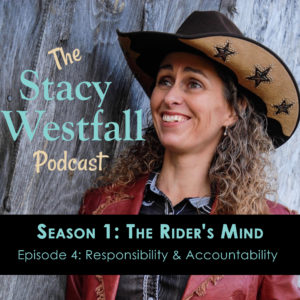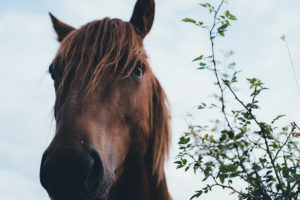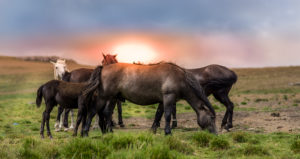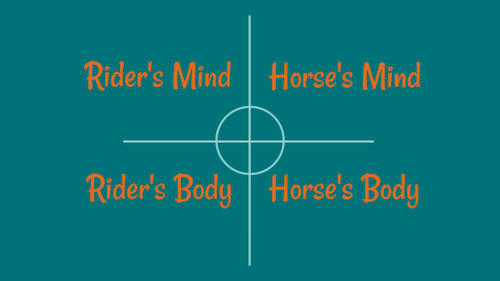Episode 4: Responsibility & Accountability

In episode 3, I talked about the three stages that riders go through in their horsemanship journey. I also discussed a little bit about responsibility. In today’s part 2, I’m diving a little deeper into how I think responsibility and accountability fit into the three stages.

Subscribe and never miss an episode! (I listen in the barn and when I’m out driving)
Subscribe Free
Need help subscribing? Here are two video links that will walk you through subscribing to a podcast. I didn’t make the videos so be sure to search for Stacy Westfall after you download your podcast player!
How to Subscribe to a Podcast on an iPhone: https://youtu.be/9SD8z3VJua4
How to Subscribe to a Podcast Using Stitcher App for Android:https://youtu.be/FKxnFAmNEtE
“In the dreaming phase, the responsibility is always with the horse.” Stacy Westfall Click To TweetShow Notes
[01:04] I send out a weekly email and get a lot of feedback. I received some helpful feedback when it comes to explaining responsibility.
[01:21] The dreaming phase is when people enter owning horses and they just expect it to work. I called this my Disney phase.
[01:40] The learning phase is nuts and bolts. It’s how things work.
[01:57] The balance face is when you can hold on to both ideas the dreaming and the learning. And move back and forth between the two.
[02:07] There is some resistance to responsibility in people who are unaware that they are afraid to give up the dreaming phase.
[02:21] Feedback from people who are afraid of being mean to their horses.

[03:39] You can have both phases at the same time.
[04:45] In the dreaming phase, the responsibility is always with the horse. People think things are magically going to work.
[05:07] When we move into the learning phase, the responsibility shifts over completely to the rider. The rider feels like they are 100% responsible for whatever happens.
[05:30] In the dreaming phase the horses have no accountability. They have us hoping, but if it doesn’t work it just doesn’t work.
[05:46] In the learning phase, we are responsible, but we’re not sure what that means as far as holding the horse accountable.
[06:41] Natural push back from a horse makes people reluctant to set a boundary. People worry if their horse will still like them.
[07:10] Think about whether it’s possible even in human relationships to have great accountability breed more trust.
[07:33] I know of a high school teacher who sets very high standards for their students. This teacher ended up being the most respected person there.

[07:48] Somewhere in the mix of responsibility and accountability, we breed this storm of respect.
[08:00] When you are working with your horse you are each 100% responsible.
[08:25] You will have to work out the consequences inside your relationship.
[08:58] Stand outside the pasture and watch and see how your horse reacts and what emotions they are going through.
[09:23] Horses that challenge lines are telling you something about who they are when you go to work with them.
[09:32] Stop and think about how you are interpreting the things that I am saying when I talk about the dreaming stage, the learning stage, and the balancing stage or when I bring up words like responsibility and accountability and respect. How do these words fit in with what you are experiencing with your horse?
“Watch a horse in the herd, and you will actually know a lot about the horse that you are going to work with.” Stacy Westfall Click To TweetLinks and Resources:
- Blog post on Stacy wrote about the 4 Square model: Quickly Evaluating Problems with Horses and Riders

The 4 Square Model Stacy uses when approaching horse and rider challenges.

Subscribe Free
74 Comments
Leave a Comment
SUBSCRIBE TO THE PODCAST HERE:





YOURS FREE
WHY IS MY HORSE...?





I too will always want to continue to learn more about horses.. I have ridden all my life in the Western Disciplines and I am now, learning Dressage.
I have a question for you…regarding my 13 year old, 15h, mutton withered, short backed, round bodied Paint and saddle placement.
It took 40 western saddles and over 5 years with many professionals….and in October 2018, I finally found saddles in both disciplines for my little Tank. It was much easier to find a Dressage Saddle…I only went through 5. Along this saddle journey, I hired Vets, Body Workers, Equine Chiropractors and saddle fitters, I have found that there are so many “ideas” as to where to place the saddle on the horse’s back, both with Dressage and Western Saddles. I have not found any two professionals that agree on just where and how they place the saddle. I have had 25 horses in over 60 years and I’ve never had so many fitting challenges as with this horse. I recently purchased a shoulder relief cinch, in both disciplines and it has also helped, greatly. Although I have found saddles to fit this horse, regardless; I would still like to hear your opinion on saddle placement and markers, please. Thank you.
I think this should be a video sometime down the road when I’m hanging out with some saddle fitters. Saddle fit is about like shoe sales. So many feet, so many uses, so many issues, so many opinions!
The number one feedback I take is from my horse. I always check for soreness and quiz my massage therapist and chiropractor for their opinions. I can also feel things change.
At the core I think that this ‘change’ is ultimately the biggest problem. For example, an unfit horse worked for six months changes. A young horse still growing-changes. An older horse losing muscle tone changes. So much change! I take it back. Fitting shoes is easier than saddles!
I’ll keep this subject in mind when making videos. The short answer is that there is NO EASY ANSWER.
I’ve carried this little bit of mindfulness with me throughout the past few days since listening to the podcast. This helped me realize that I was setting loose standards, and really just confusing my horse more in the process – which is more detrimental to the horse in the long run. Setting standards and following them is so important with horses, and the best and only way to build a strong relationship with them. I am guilty of not always sticking to my own standards with my mare; but we are both better, individually and together, when expectations are met. Thanks for the advice, Stacy.
I am in the learning phase, and I love to see the change in my horse when I make him accountable. I think of him as an unruly teenage boy who challenges my limits. But he quickly changes his tune and becomes respectful when I make him responsible for his actions and the choices he makes. I am in awe of the rapid change in behavior after demanding a little work out of him when he is making poor choices, that being moving his feet or standing quietly when it is not his choice. He always seems happier and more relaxed after reminding him of limits and his role and responsibility of his own actions. Before I began expecting his participation in our relationship he was unruly and dangerous because I allowed that, when I was trying to be responsible for everything.
Great topic! I really like how you said the horse is 100% accountable and you are 100% accountable. Its a partnership with 200% accountability. If one fails, the other one fails. It makes sense! If you dont take 100% while riding your horse, they aren’t gonna be 100% either. If you hold high standards or accountability, you get respect and achieve better- just like the teacher in the school analogy! That was great. It really got me thinking about putting leadership, respect and accountability all together as an equine partner. That is one reason now why I’m clicking more with my sister’s tough gelding. I know where I am as a leader and rider on him, which makes him and I right around the 200% team accountability together. This is all making sense now!
I definitely put too much responsibility of myself. If I don’t get the result i want, I think it is all my fault. It may not always be my horse’s either, but I need to realize that I’m still learning and my responsibility right now is to do the best I can for where I am now.
Interesting.
This is so accurate. I struggle with staying neutral when something goes wrong or my horse doesn’t respond correctly. I struggle not taking things personally. I tend to take all the responsibility, but I try to remind myself that the horse is also responsible too. We both share it. Like you said, I try to watch how my horse or another horse interacts and what he is like in the herd. That helps me understand how and why he is responding. I know me and my horse has some more work to do but we have already come a long ways!
Thank you so much for sharing your knowledge!
-Bekah
It’s amazing how responsibiltiy and accountability can be directed towards kids as well!!!
Many people and trainers talk about the relationship between horse and rider as a partnership. However, it’s rarely discussed as responsibility or accountability. Thank you Stacy for making this clearer for me. When I hear people talk about a partnership with their horse, I envision horse and rider working in sync with one another but not how they got to that point. Adding the idea of responsibility and accountability alters that vision. This podcast explains it very well. To reach a partnership the horse and rider must both share equal parts of the responsibility and be held accountable. I like how you mention that you will have to work out the consequences inside your relationship. Not all horses will willingly accept their share of the responsibility. As you mentioned in a previous podcast, some horses will really challenge your leadership. So in entering a relationship with a horse there are variables that you will have to work out. Consequences to the efforts of creating a partnership.
Stacy what an important topic to cover. I think that especially in the dreaming stage many people forgot that they are working with a 1000 poimd animal,with its own mind and personality. It is our responsibility as a rider to keep ourselves and horses safe. It took me a little time to understand that loving our horses is important but if we let them walk all over us and do not hold them responsible for their actions we are not doing right by that horse and opening the door for potential dangerous situations. I love love how you talk about how their is a total of 200% accountability with 100% for the rider and 100% for the horse. It is a partnership and team work is so important and neither horse nor rider should bare all the burden. I try to find a balance of making sure I am loving my horses and treating them right but also making sure I am showing them that I will not be pushed around and inviting in dangerous situations for us both. It is so critical to build a trusting relationship with your horse as it is the foundation of everything that we do with our horses and it is the glue that holds the horse and human partnership together. If I do not hold myself and my horse responsible and accountable I cannot have trust and we cannot move toward as a team. My favorite podcast thus far such an important topic and great thoughts.
I haven’t thought of it like that before.
Hey Stacy I like the way you explain what you are trying to get across regarding the three stages including accountability and responsibility. The teacher with high standards must also be a great leader to have those students believing in the teacher and that there will be a consequence if they don’t perform. We as humans need to understand that horses are not humans and do not think like we do. Horses deal with each other quite simply and if we replicate those actions we too will end up with a respectful horse. All horses are born with ten inherent traits that we as humans have a responsibility in understanding each of those traits to fulfil our potential and the horses, and be safe working around horses, none of those traits mention emotions or the horse liking or disliking someone or something. I mentioned in another comment about our responsibility to provide clear direction and guidance to the horse and thus allowing/giving the horse responsibility to find the right answer. If we provide clear direction and guidance and the horse does not respond then there must be a consequence, however we must also be very aware of our signals – are they clear enough, is my focus and direction crystal clear, does the horse understand what I’m asking him/her to do – this is my responsibility to ensure I get the questions right.
This specific podcast is a motivator for me… the phrase “When you are working with your horse you are each 100% responsible.” really hits home and drives me to try and hold my equines more accountable. I definitely hold myself accountable if I feel like I didn’t hold up my end of whatever we’re doing. Each of us being 100% accountable equals a great partnership!
Wow, very interesting concept!
I’m definitely in the learning phase, as far as holding myself 100% responsible for whatever my horse does. If he doesn’t do what I’m asking for, I tend to think, “Maybe I didn’t ask correctly. Maybe he just doesn’t understand and needs more training in this area.” While these things may be true, I need to hold my horse responsible for his actions also. I’m still figuring this balance out, but this podcast helped a bunch!
I love the part in this podcast about going back and watching your horse in the pasture. You have to see how your horse is without you being there to influence his decisions. You have to be a leader and teacher before your horse will really understand what you are asking of him. It’s awsome watching horses in the herd because you can see their responsibility in that herd and what place they fall into in that herd.
The responsibility podcast has been my favorite. I used to struggle with the horse liking me and creating a very misbehaved animal. I am moving past that, and your comments help.
I think your concept of achieving balance could be a multipart podcast all on its own. We all love the magic. It’s part of what drew us here. If we’re honest we know we need to grow but don’t want to lose that part. Please keep working on examples of ways to keep the magic.